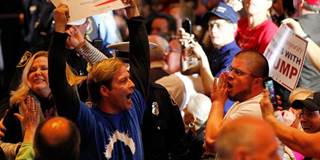Voters in the US have shown their anger this year by turning out in droves for anti-establishment presidential candidates, both Democratic and Republican. One factor fueling voter unrest is evident: Many ordinary Americans think that the deck is stacked against them.
STANFORD/NEW YORK – Voters in the United States have shown their anger this year by turning out for anti-establishment candidates, both Democratic and Republican, in large numbers. One factor fueling voter unrest is evident: many ordinary Americans think that the deck is stacked against them. Indeed, when asked the question, “Do you think the US economic system generally favors the wealthy or is fair to most Americans?” a whopping 71% – including a majority of Republicans – said that the system favors the wealthy.
The tax system is a major source of this perception. When Americans are asked specifically about taxes, the same message emerges; a majority of voters (62%) believe that the US tax system favors the wealthy. In response to this growing resentment, both parties’ presidential candidates have promised to reestablish economic fairness and reform the tax system.
The three most prominent anti-establishment candidates have proposed starkly different tax plans. Bernie Sanders, a political independent running as a Democrat, is proposing a $15.3 trillion tax increase over the next decade. Under his plan, the wealthy would experience the biggest hikes, with the marginal tax rate on the richest Americans reaching 54.2%.

STANFORD/NEW YORK – Voters in the United States have shown their anger this year by turning out for anti-establishment candidates, both Democratic and Republican, in large numbers. One factor fueling voter unrest is evident: many ordinary Americans think that the deck is stacked against them. Indeed, when asked the question, “Do you think the US economic system generally favors the wealthy or is fair to most Americans?” a whopping 71% – including a majority of Republicans – said that the system favors the wealthy.
The tax system is a major source of this perception. When Americans are asked specifically about taxes, the same message emerges; a majority of voters (62%) believe that the US tax system favors the wealthy. In response to this growing resentment, both parties’ presidential candidates have promised to reestablish economic fairness and reform the tax system.
The three most prominent anti-establishment candidates have proposed starkly different tax plans. Bernie Sanders, a political independent running as a Democrat, is proposing a $15.3 trillion tax increase over the next decade. Under his plan, the wealthy would experience the biggest hikes, with the marginal tax rate on the richest Americans reaching 54.2%.